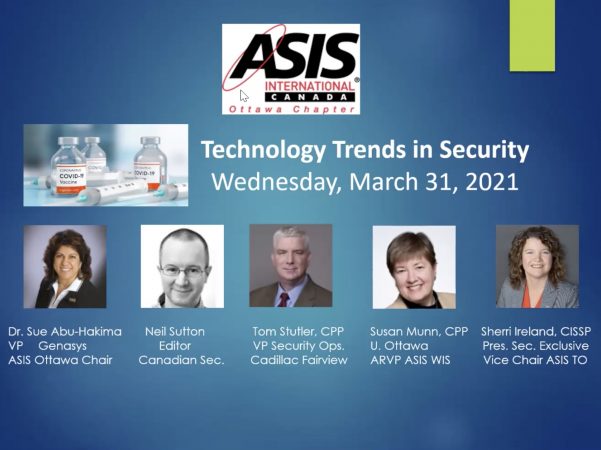
 The Ottawa Chapter of ASIS International recently convened a roundtable discussion to examine a variety of topics stemming from the pandemic, as well as issues that were already on the security industry’s radar such as technology, leadership and convergence.
The Ottawa Chapter of ASIS International recently convened a roundtable discussion to examine a variety of topics stemming from the pandemic, as well as issues that were already on the security industry’s radar such as technology, leadership and convergence.
The panel included Tom Stutler, vice- president of security operations, Cadillac Fairview; Susan Munn, assistant regional vice-president (ARVP), ASIS Women In Security; and Sherri Ireland, vice-chair, ASIS Toronto chapter. I also participated as a panelist, representing Canadian Security. The panel was moderated by Dr. Sue Abu-Hakima, chair of the Ottawa chapter.
The format of the panel provided each speaker 10 minutes to highlight a topic of interest — the remainder of the hour-long session comprised open discussion and audience Q&A.
As the opening speaker, I provided an overview of some of the major trends resulting from, or accelerated by, the pandemic. Most, if not all, of those trends have been covered in Canadian Security and sister publication SP&T News, as well as the half-dozen virtual summits we have hosted as an organization since the pandemic began over a year ago.
I broke those down into three major categories: technology (such as touchless access control, temperature sensing equipment, mass notification, video monitoring and smart buildings); rethinking the approach to pandemic planning and plan implementation; and the work trends that have affected security departments such as work-from- home policies.
In his opening remarks, Stutler asked attendees “not to let the lessons of COVID slip, because we’ve got some opportunities here.” Expanding on the topic of touchless access control, he outlined the capabilities of mobile credentials, describing how it’s possible to enter a building and navigate all the way to an office space without having to touch anything along the way.
“People don’t leave home without their phone,” he said. “It makes a lot of sense for the next year or two for all companies to take a hard look at the user experience: the journey of the employee, the journey of the visitor, the journey of the delivery person, and really take it to the next level.”
Susan Munn, next to speak, reminded attendees that many of the central tenets of professional security — such as securing facilities and preventing thefts and frauds — have not gone away during the pandemic. However, some modes of leadership have had to adapt to new circumstances. “Remote management, in some form, is here to stay,” said Munn, referring to employee decentralization. “You’re going to really have to work as leaders to stay connected to your organization, where it’s going and what the business is all about.”
Leadership isn’t only conferred by title or company position, added Munn — it’s an attitude and approach that can be adopted at any level of seniority, from CEO to entry level. “You can always have the opportunity to lead. You have to think with that mindset,” she said.
Ireland, the final speaker of the session, addressed one of the major industry talking points of the last several years: the convergence of physical and IT security. “Now, more and more, the physical security team is merged with the IT team and mostly because we’re protecting assets,” she said. “What’s one of the most valuable assets right now? Obviously an organization’s data.”
But as much as these two aspects have become inter-related, they are still individual disciplines with subject matter experts that tend to lean in one direction or the other. A top level security professional may have jurisdiction over both the physical and logical, but within the department there is still room for specialization, said Ireland.
Across the tone of the entire panel discussion was a recognition of the importance of mental health in the workplace.
Stutler commented that the pandemic has brought about an “awakening” in terms of the importance of good mental health practices and the removal of some of the stigma of mental health as a conversation topic.
Munn commented that “we’re finally busting down the mental health barriers in society. There is a lot of underlying stress… I encourage everybody to take care of your health, both emotionally and physically.”
Print this page
Advertisement
- Attack that held U.S. pipeline hostage could happen in Canada: cyberprotection chief
- The importance of getting your facts first
Leave a Reply